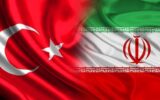Competition between Tehran and Ankara for the gas hub

According to the exclusive report of Energy Press, in the fall of 2022, Russia proposed the establishment of a gas hub in Turkey in order to deepen trade relations with Turkey. The essence of the project is that after the Nord Stream-1 and Nord Stream-2 pipelines are stopped due to sabotage, the flow of Russian gas from the northwest can move to the south. At the same time, Turkey plans to create an electronic platform to coordinate prices based on global market conditions and subsequently trade gas to consumers (mainly Europeans) without political differences.
Ankara supported Moscow’s proposal and of course there is a lot of room for coordination of legal, organizational and technical issues. As a result, the Turkish side, based on geographical logic, proposed the territory of Eastern Thrace as a gas hub location, the formation of relevant technical infrastructure for gas accumulation, storage and e-commerce platform. However, due to the devastating earthquake in February and the elections (parliament and presidency), the negotiations of the gas project were delayed.
But like all business projects, the parties align their approaches according to their financial and economic interests during negotiations. Turkey is an important trading partner for Moscow, which claims the maximum in order not to lose the minimum. In addition, the consequences of the devastating earthquake and instability in the economy dictate new high standards for participation in promising projects for Ankara. It should be added that President Erdoğan is in a very important geopolitical position, because he understands the economic demand of implementing such a project for Russia, which is under the pressure of Western sanctions, and sees it as an opportunity to consolidate Russia’s energy link with the gas of Kazakhstan and Turkmenistan to implement an ambitious program. In line with the convergence of Turkic countries. In particular, Ankara believes that it is necessary to fill the gas hub from different sources. According to Turkish experts, this creates a large volume of imported raw materials and protects the country from political pressures on the export route (especially the sale of the same Russian gas to Europe).
Currently, Turkey receives gas from Russia, Azerbaijan and Iran. Accordingly, Ankara expects to complete the list of potential suppliers with key Caspian countries such as Kazakhstan and Turkmenistan. For example, Turkmenistan has three important advantages for Türkiye; First, obtaining 7% of the world’s gas, secondly, strengthening its energy influence on the gas market of the European Union and thirdly, creating mutual benefits for the convergence of Turkish countries and ensuring Turkey’s systematic access to the Central Asian market.
Meanwhile, while negotiations continue to clarify the parameters of the gas hub in Eastern Thrace, Russian gas is being traded to foreign markets (including Europe) through Turkey. Traders buy Russian gas in Turkey and resell it to the EU (eg to Bulgaria).
In all commercial transactions, the key variable is the price of goods. Accordingly, the price parameters of Moscow and Ankara may be significantly different. Russia wants to maximize gas exports to Europe after the disruption of the Nord Stream pipeline, the reduction of gas transit through Ukraine and the suspension of the Yamal-Europe pipeline. Given the high potential of gas volumes to increase export supply, building additional infrastructure in Turkey in the short term is more profitable for Russia than building alternative long pipeline routes to China.
At the same time, EU countries, under pressure from the United States, have so far shown little interest in supplying gas from Russia through pipelines. But Europeans buy LNG gas, including Russia. In this situation, Turkey is trying to maintain the existing status of the gas hub project and sell the required volume of Russian gas to Europe without much fanfare.
In fact, Turkey is becoming a real energy hub for Europe, through which gas and oil products are supplied to the European market. In this regard, the export of Turkish oil products to the European Union in the first three quarters of 2021 was 3.71 million tons, which has increased to 8.24 million tons by September 2023. Therefore, the Europeans increase the purchase of Russian oil products through Turkey to circumvent the “sanctions”.
Importing new volumes of gas and oil products from Russia for re-export to Europe is in line with Turkey’s interests. As for the gas hub, Ankara expects not only to form an e-commerce platform, but also to control the price of gas sold to foreign markets. Turkey plans to achieve the status of a “logistics superpower” through this project.
- Comments sent by you will be published after approval by site administrators.
- Comments that contain slander will not be published.
- Comments that are not in Persian or not related to the news will not be published.

Comments
Total comments : 0 Awaiting review : 0 Date: 0